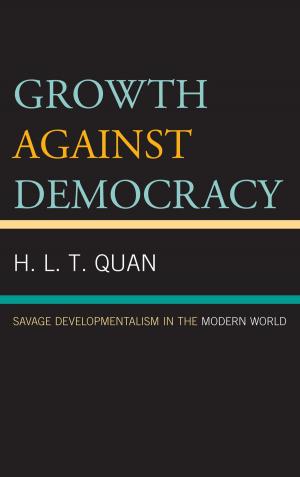The Logic of the Cold War
The Web of Interdependent Governance and the Connective Power
Nonfiction, Social & Cultural Studies, Political Science, International, International Relations, Politics, History & Theory, Social Science, Sociology| Author: | Tian-jia Dong | ISBN: | 9780739190128 |
| Publisher: | Lexington Books | Publication: | August 24, 2018 |
| Imprint: | Lexington Books | Language: | English |
| Author: | Tian-jia Dong |
| ISBN: | 9780739190128 |
| Publisher: | Lexington Books |
| Publication: | August 24, 2018 |
| Imprint: | Lexington Books |
| Language: | English |
The Cold War revealed, for the first time in human history, the logic of human togetherness, which indicated that it was not only necessary for nation-states to live together but also possible for them to do so. The necessity was because of the inescapably shared vulnerability of “mutually assured destruction,” not only in terms of security but more so in economic well-being and political stability. The possibility was due to the unipolar world structure sustained by the global governance web of interdependent partnership which worked powerfully “between” the power agents to ensure the best of all possible world. This latent governance system was both hierarchical and dynamic because its power was “connective” in the sense that power was rooted in one another and the ability to be interdependent by empowering other power agents and sharing vulnerability at the same time was the way of becoming the “nucleus” on the global web of interdependent partners and hence gaining power in transforming one another connectively and governing the world collectively. George Kennan’s patience in building up hard and soft powers “within” individual power agents of the web and Wilson/Roosevelt’s institutionalization of collective power “above” each power agents contributed to the construction of the system. The Soviet big-brotherly governing type was proven a failure.
The Cold War revealed, for the first time in human history, the logic of human togetherness, which indicated that it was not only necessary for nation-states to live together but also possible for them to do so. The necessity was because of the inescapably shared vulnerability of “mutually assured destruction,” not only in terms of security but more so in economic well-being and political stability. The possibility was due to the unipolar world structure sustained by the global governance web of interdependent partnership which worked powerfully “between” the power agents to ensure the best of all possible world. This latent governance system was both hierarchical and dynamic because its power was “connective” in the sense that power was rooted in one another and the ability to be interdependent by empowering other power agents and sharing vulnerability at the same time was the way of becoming the “nucleus” on the global web of interdependent partners and hence gaining power in transforming one another connectively and governing the world collectively. George Kennan’s patience in building up hard and soft powers “within” individual power agents of the web and Wilson/Roosevelt’s institutionalization of collective power “above” each power agents contributed to the construction of the system. The Soviet big-brotherly governing type was proven a failure.















